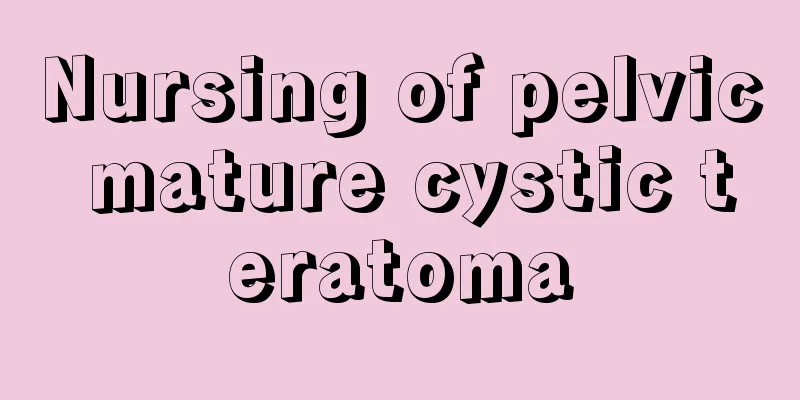Nursing of pelvic mature cystic teratoma

|
Pelvic mature cystic teratoma is generally a benign tumor, and surgical treatment can recover well. Experts say that daily care should be strengthened to enable the body to recover quickly and prevent recurrence. What should be paid attention to in the care of pelvic mature cystic teratoma? The importance and precautions of a proper diet before and after surgery: 1. Eat a semi-liquid diet one day before the operation and do not eat or drink on the morning of the operation to prevent accidental inhalation of anesthesia. 2. Do not eat for 6 hours after the operation, and then eat liquid food, avoid sugar and milk. After the gas is discharged, gradually change from semi-liquid food to normal meals. 3. Purpose and necessity of preoperative preparation: Skin preparation is to clean the skin and prevent infection of the incision. The purpose of preoperative medication is to ensure sleep, induce anesthesia, enhance the anesthesia effect, and reduce glandular secretion. Gastrointestinal preparation prevents aspiration of vomitus during and after surgery, prevents accidental injury to the intestine during surgery, facilitates smooth surgery, and prevents abdominal distension after surgery. 4. Placement of a urinary catheter facilitates surgery and prevents accidental injury to the bladder. 5. Preoperative blood preparation and drug allergy test to prepare for intraoperative and postoperative blood transfusion and medication 6. After the operation, you may feel general discomfort, dizziness, and incision pain, which are normal phenomena. Use painkillers if necessary. You may also experience nausea and vomiting, which are mostly caused by anesthetics and surgical stimulation. 7. Teach patients techniques for turning over after surgery, methods for reducing abdominal tension, techniques for preventing incision pain when coughing, techniques for getting out of bed, and how to use a toilet in bed, etc. 8. After the operation, lie flat without a pillow and tilt your head to one side to prevent headaches, prevent suffocation due to accidental inhalation of vomitus, and prevent shock. 9. Removing the urinary catheter and urinating early are beneficial to the recovery of bladder function and the prevention of urinary retention; avoiding urination difficulties due to overfilling of the bladder 10. Discharge Instructions: (1) Rest for 1 month after hysterectomy and refrain from sexual intercourse for 2-3 months. Avoid fatigue. After myomectomy, refrain from bathing in the tub and sexual intercourse for 1 month. (2) 7-14 days after total hysterectomy, there will be a small amount of pink secretions in the vagina. This is caused by the dissolution of the intestinal stump of the vagina. This is a normal phenomenon and does not require treatment. Just rest properly. If the secretions are bloody and the amount is like menstrual period, you should seek medical attention immediately. (3) You can take a shower one week after the stitches are removed, and wash your wound with warm water on a daily basis to prevent colds. |
<<: Nursing of benign ovarian teratoma
Recommend
What is a hermaphrodite
In life, many people don't know enough about ...
Will my father's prostate cancer be inherited?
Will my father's prostate cancer be inherited...
Can the bulging veins on the forehead be restored?
Protruding forehead veins are a problem that many...
Does Vitamin C Cure Bad Breath?
Vitamin C is an antioxidant and is good for the s...
What fruits can patients with advanced lung cancer eat
Patients with advanced lung cancer can eat mangos...
The difference between lip tattoo and lip bleaching is actually here
Lip tattooing and lip bleaching are common things...
What are the dietary precautions for brain cancer patients
For malignant tumors in the brain, the diet shoul...
What should I do if I have severe back pain in the late stage of gastric cancer?
What should I do if I have severe back pain in th...
How to determine whether bile duct cancer is cured
No matter what disease a patient has, what they c...
What is the role of chemical cellulose?
Cellulose is a nutrient widely found in various f...
The functions and effects of the lungs
The lungs are an important organ in our human bod...
Herpes window period
Generally speaking, shingles can be understood th...
Is it okay to drink yogurt after eating an apple? How to make apple yogurt
Apples are rich in nutrients, especially minerals...
What is the relationship between urine color and gynecological diseases
Life is inseparable from "eating, drinking, ...
About the treatment of uterine cancer
There are many ways to treat endometrial cancer. ...









